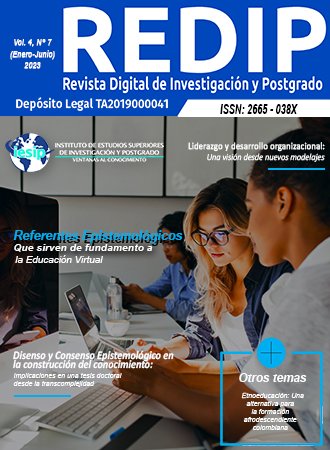School environment from the optimism pedagogy
DOI:
https://doi.org/10.59654/cmv87c40Keywords:
Pedagogy, Optimism Pedagogy, Special Pedagogy, School Environment, School Coexistence.Abstract
Over time, humanity has been living an excessive development in all social spheres, generating commotion on a personal, group, individual and professional level, often feeling existential and motivational crises, generating a pessimistic environment. This situation is also felt in the school environment, and it is for this reason that, in the actors, all capacity and ability to make life go well is minimised, and therefore a school environment with a false optimism. The aim of this study is to analyse the school environment from the pedagogy of optimism, in such a way that the enquiry was situated within the interpretative paradigm, qualitative approach with bibliographic design, of the documentary type. As a result, there are few published studies on the pedagogy of optimism, and the importance of managing the different feelings that form optimism, and the factors that concur to minimise or destroy it. Therefore, it is concluded that the school environment needs the presence of a transdisciplinary programme so that these spaces are filled with a pedagogy of optimism, in order to minimise attitudes that do not allow the maximisation of the teleological element of the human being.
Downloads
References
Arias, F. (2016). El proyecto de investigación. Introducción a la metodología científica. Editorial Episteme.
Arroyo, C. (2017). La neuroeducación demuestra que emoción y conocimiento van juntos. Lux.
Bedoya, J. (2002). Epistemología y pedagogía. Ecoe.
Blanco, R. (2016). Docencia y desarrollo humano. Alhambra Editores.
Camacho, J. (30 de septiembre de 2017). Una sociedad pesimista. El Siglo, pág. 8. https://www.google.com/url?sa=t&rct=j&q=&esrc=s&source=web&cd=&cad=rja&uact=8&ved=2ahUKEwjVouPigp-BAxVvQTABHQnIAaAQFnoECBQQAQ&url=https%3A%2F%2Fwww.dw.com%2Fes%2Funa-sociedad-pesimista%2Fa-2289418&usg=AOvVaw0jeAu7V15zVg80erfuwi8A&opi=89978449
Corbín, J. (2016). Sentimientos y salud mental. Fenix.
Craig, A. (2015). Cómo sientes tú. Princeton University Press.
De Barbieri, A. (2015). ¿Puede el docente ser pesimista? CIPES.
Flores, A. (2013). Conferencia sobre el optimismo como sol que levanta la niebla de la tristeza.
Optimismo en el Campo Médico (págs. 10-22). Sindicato Médico del Uruguay.
Giménez, H. M. (2015). Optimismo y pesimismo: variables asociadas en el contexto escolar. Pulso, 9-23. https://www.google.com/url?sa=t&rct=j&q=&esrc=s&source=web&cd=&cad=rja&uact=8&ved=2ahUKEwiZ1I2tgZ-BAxV-SjABHau0DYQQFnoECBQQAQ&url=https%3A%2F%2Fdialnet.unirioja.es%2Fservlet%2Farticulo%3Fcodigo%3D1370895&usg=AOvVaw0PGEHb4qEcVst8lQd8QOmi&opi=89978449
Goleman, D. (1998). La práctica de la inteligencia emocional. Kairos.
Goleman, D. (2008). Inteligencia Emocional. Kairos.
Guillen, L. (2016). Humanismo y Educación. Lux.
Hevia, D. (2014). Pedagogía y arte. Sol Ediciones.
Hoffman, M. (2002). Desarrollo moral y empatía. Books.
Kohlberg, L. (1992). Psicología del desarrollo moral. Desclée de Brouwer.
López, L. (23 de febrero de 2019). Cómo crear un ambiente positivo en clase. Contexto educativo. http://www.contexto-educativo.com.ar/como-crear-un-ambiente-positivoen-clase/
Marcos, L. (2015). La fuerza del optimismo. Punto de Lectura.
Miranda, S. y Ortiz, J. (2020). Los paradigmas de la investigación: un acercamiento teórico para reflexionar desde el campo de la investigación educativa. Revista Iberoamericana para la Investigación y el Desarrollo Educativo, 5-34. https://www.google.com/url?sa=t&rct=j&q=&esrc=s&source=web&cd=&cad=rja&uact=8&ved=2ahUKEwiswYiYgZ-BAxU7TDABHQHpAq4QFnoECA4QAQ&url=http%3A%2F%2Fwww.scielo.org.mx%2Fscielo.php%3Fscript%3Dsci_arttext%26pid%3DS2007-74672020000200164&usg=AOvVaw0Ol2MnLqinSSvsrH8jptnG&opi=89978449
Moreno, L. (2018). Los beneficios de expresar lo que sentimos. Lux.
Ocoró, A. (12 de febrero de 2016). El bien ambiente escolar es vital para el aprendizaje. Educación, p. 18. https://www.google.com/url?sa=t&rct=j&q=&esrc=s&source=web&cd=&cad=rja&uact=8&ved=2ahUKEwj0yb6DgZ-BAxVelmoFHdJoCEIQFnoECBcQAQ&url=https%3A%2F%2Fwww.eltiempo.com%2Fvida%2Feducacion%2Fimportancia-del-ambiente-escolar-para-el-aprendizaje-48178&usg=AOvVaw0cZm6Xbi8xcNMrdHXkWAnX&opi=89978449
Quintero, C. J., Munevar, R. y Munevar, F. (2015). Ambientes escolares saludables. Revista de salud pública, 229-241. https://www.google.com/url?sa=t&rct=j&q=&esrc=s&source=web&cd=&cad=rja&uact=8&ved=2ahUKEwi3s-XOgJ-BAxU0RzABHRimA-kQFnoECBcQAQ&url=http%3A%2F%2Fwww.scielo.org.co%2Fscielo.php%3Fscript%3Dsci_arttext%26pid%3DS0124-00642015000200007&usg=AOvVaw2tRhyn8iUH5jUASDUwyAWj&opi=89978449
Ricoy, C. L. (2006). Contribución sobre los paradigmas de investigación. Revista do Centro de Educacao, 11-22. https://www.google.com/url?sa=t&rct=j&q=&esrc=s&source=web&cd=&cad=rja&uact=8&ved=2ahUKEwim7-uygJ-BAxU3RjABHVpwCvcQFnoECA0QAQ&url=https%3A%2F%2Fwww.redalyc.org%2Fpdf%2F1171%2F117117257002.pdf&usg=AOvVaw25z2IrkSCdHY8965JlZHMv&opi=89978449
Ridder, D., & Schreurs, K. (2014). Los beneficios relativos de ser optimista: el optimismo como recurso de afrontamiento es la esclerosis múltiple y la enfermedad de Parkinson. Diario británico de Salud Psicológica, 89-129.
Rojano, J. (2008). Conceptos Básicos en Pedagogía. Revista Electrónica de Humanidades, Educación y Comunicación Social, 3(4), 36-47. https://dialnet.unirioja.es/servlet/articulo?codigo=2717946
Rovira, A. (2005). Los beneficios del optimismo. El País, pág. 12. https://elpais.com/diario/2005/12/11/eps/1134286015_850215.html
Seligman, M. (2003). La auténtica felicidad. Ediciones Vergara.
Soto, P. (2016). Gestión de instituciones educativas inteligentes. Mc Graw-Hill.
Taylor, S. y Bogdan, R. (2009). Introducción a los métodos cualitativos de investigación. Paidos.
Valentín, O. (2011). La empatía en la educación: estudio de una muestra de alumnos universitario. Revista Electrónica de Psicología Iztacala, 174-190.
Zazueta, H. y Arciniega, L. (2010). Desarrollo de los valores en el trabajo. Trillas.
Published
Issue
Section
License
Copyright (c) 2023 Revista Digital de Investigación y Postgrado

This work is licensed under a Creative Commons Attribution-NonCommercial-ShareAlike 4.0 International License.
Esta licencia permite a los reutilizadores distribuir, remezclar, adaptar y desarrollar el material en cualquier medio o formato únicamente con fines no comerciales, y solo siempre que se atribuya al creador. Si remezclas, adaptas o construyes sobre el material, debes licenciar el material modificado bajo términos idénticos. CC BY-NC-SA incluye los siguientes elementos:
![]() POR: se debe dar crédito al creador.
POR: se debe dar crédito al creador.![]() NC: Sólo se permiten usos no comerciales de la obra.
NC: Sólo se permiten usos no comerciales de la obra.![]() SA: Las adaptaciones deben compartirse en los mismos términos.
SA: Las adaptaciones deben compartirse en los mismos términos.











